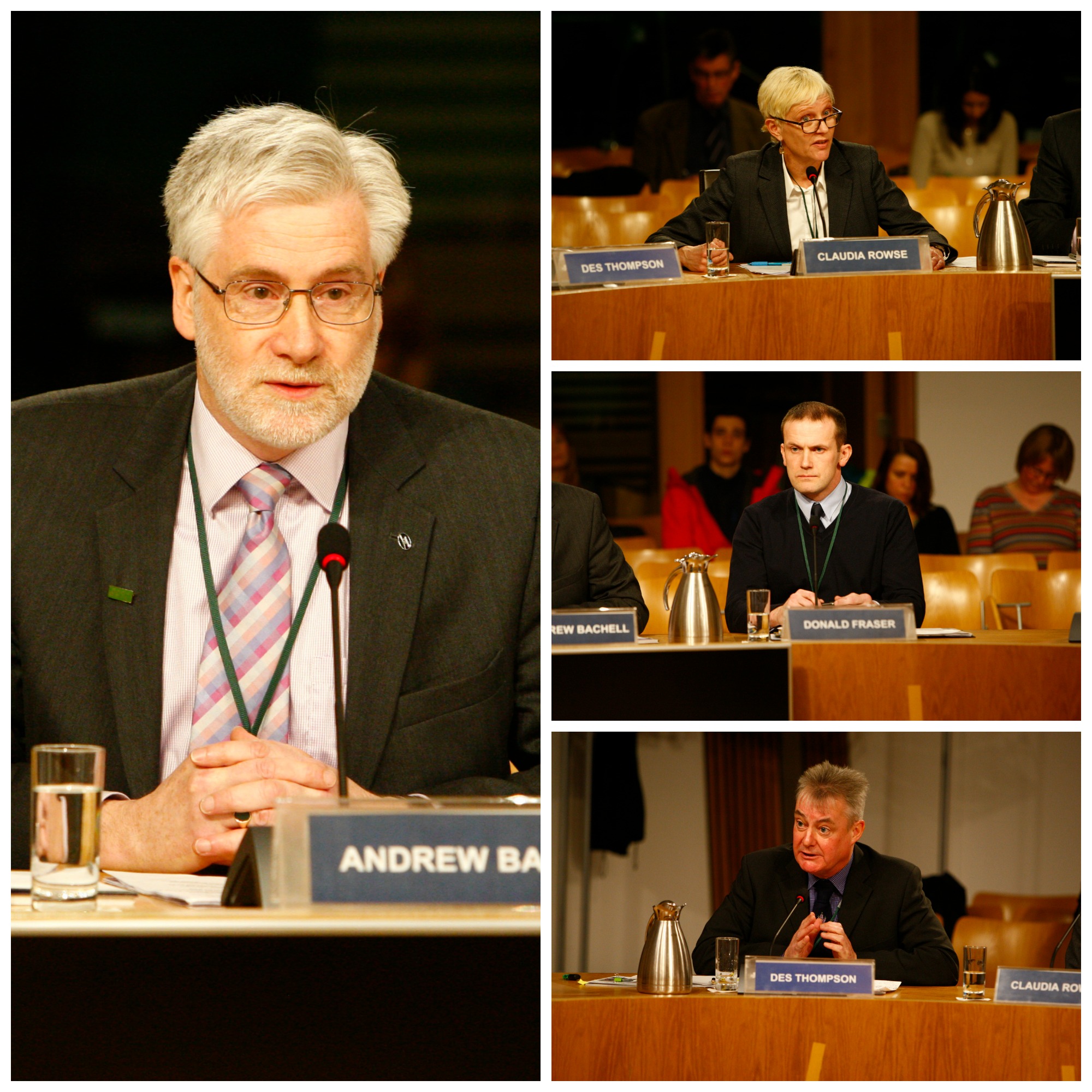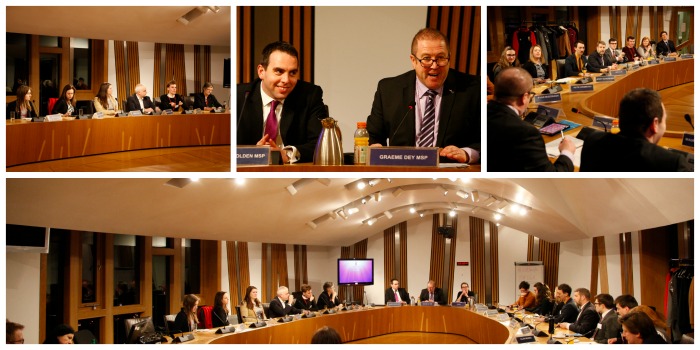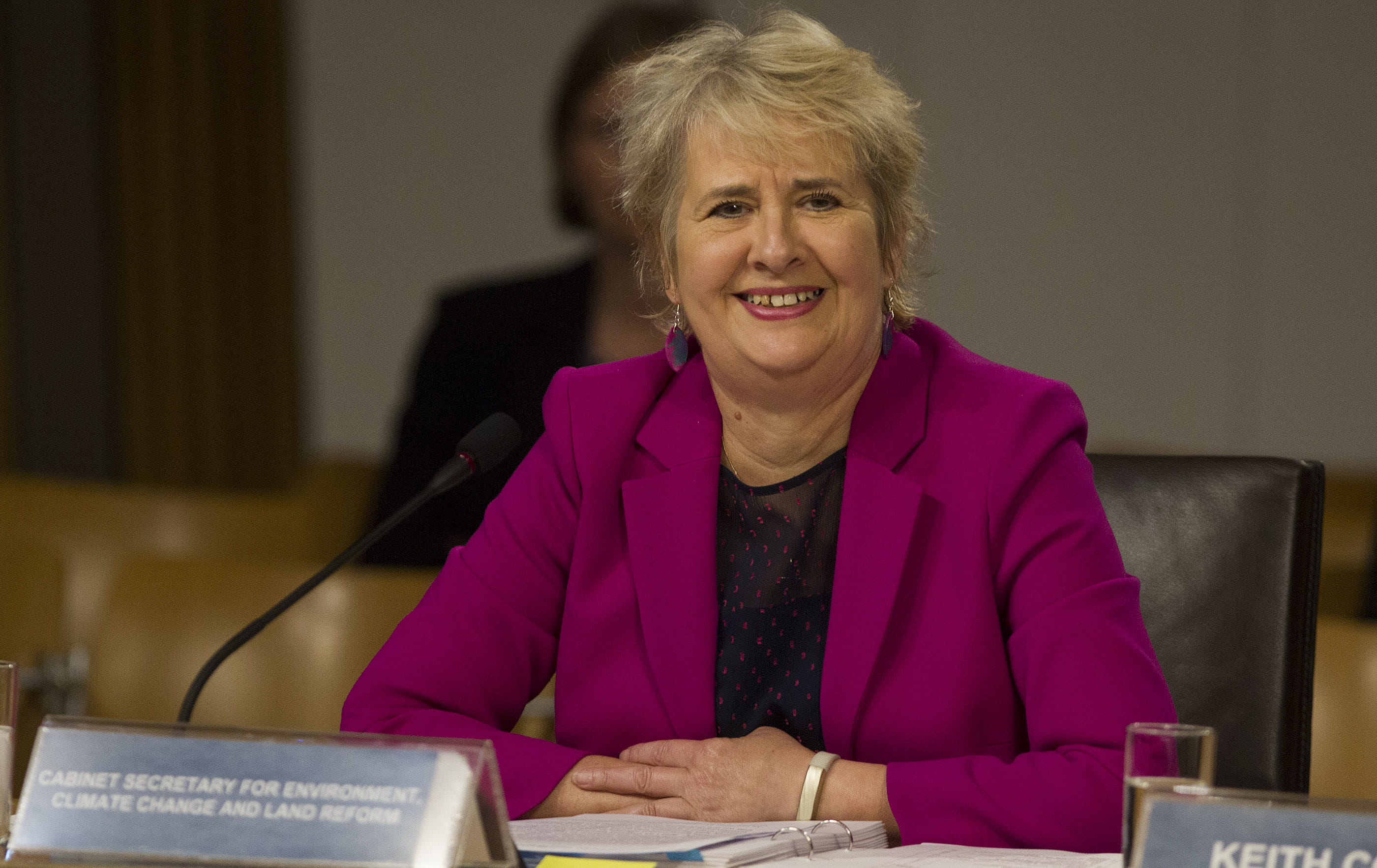Environment, Climate Change and Land Reform Committee
Annual Report 2016-17
Introduction
This report covers the work of the Environment, Climate Change and Land Reform Committee during the Parliamentary year from 12 May 2016 to 11 May 2017.
Membership Changes
Previous Members of the Committee during the reporting year:
Gail Ross (from 8 June 2016 – 6 September 2016)
Jenny Gilruth (from 6 September 2016 – 30 March 2017)

Inquiries and Reports
Evidence Sessions
The Committee hosted evidence sessions throughout the year and began by hearing from the Cabinet Secretary for Environment, Climate Change and Land Reform, Roseanna Cunningham MSP, on the newly established remit.
Image © Scottish Parliamentary Corporate Body – 2017. Licensed under the Scottish Parliament Copyright Licence
The first half of year was dominated by consideration of climate change issues, including the Scottish Government's draft Climate Change Plan, which the Committee scrutinised in collaboration with three other parliamentary Committees. The reports of all four Committees were welcomed by stakeholders. The Environment, Climate Change and Land Reform Committee agreed to continue to scrutinise the development and publication of the final Climate Change Plan, as well as consider monitoring reports produced on the progress towards targets and actions mandated by the Plan.
The Committee also heard from the Committee on Climate Change, among other stakeholders, in connection with climate change mitigation and adaptation.
 Image © Scottish Parliamentary Corporate Body – 2017. Licensed under the Scottish Parliament Copyright Licence
Image © Scottish Parliamentary Corporate Body – 2017. Licensed under the Scottish Parliament Copyright Licence
The Scottish Natural Heritage Report on Deer Management in Scotland also featured prominently in the Committee's work programme, and the Committee took evidence across four meetings from a range of witnesses, including Scottish Natural Heritage, academics, representatives of deer management and conservation groups, as well as the Scottish Government, on the issue. The resultant report was described by one stakeholder as "one of the closest examinations of deer management in Scotland ever carried out."
 Image © Scottish Parliamentary Corporate Body – 2017. Licensed under the Scottish Parliament Copyright Licence
Image © Scottish Parliamentary Corporate Body – 2017. Licensed under the Scottish Parliament Copyright Licence
The following topics were also the focus of evidence sessions:
The Crown Estate in Scotland;
Environment and climate change in the Scottish Parliament;
Appointment of the Scottish Land Commissioners and the Tenant Farming Commissioner;
Biodiversity: Scotland's Progress to 2020;
Draft Budget 2017-18;
Scottish Government Wildlife Crime in Scotland - 2015 Annual Report;
Scottish Water Annual Report 2015-16;
Review of the Protection of Wild Mammals (Scotland) Act 2002; and
Air Quality in Scotland.
Bills
Draft Budget 2017-18
The Committee agreed to focus on the work of the Scottish Environment Protection Agency (SEPA), Scottish Natural Heritage (SNH) and Marine Scotland in its scrutiny of the Draft Budget 2017-18 as much of the Scottish Government's spending within the ECCLR portfolio went to these public bodies and executive agency. Also, as the publication of the Draft Budget was delayed, it agreed to use an outcomes based approach. It considered how SNH, Marine Scotland and SEPA have each contributed to the Scottish Government's national objectives from 2011 until the end of 2016 and whether the success of meeting these objectives may have been affected by:
a declining budget over a number of years;
challenges faced in maintaining existing functions; and
the need to respond to changing priorities.
In using this approach, the Committee was able to look at the outcomes achieved to date to better target its scrutiny of future spending.
Debates
The Committee has held two debates in the Chamber of the Scottish Parliament on:
Its report on the joint Climate Change Plan, along with the three other Committees which scrutinised the plan; and
Its report on Scottish Natural Heritage Report on Deer Management in Scotland.
Legislative consent memorandums
The Committee considered the Farriers (Registration) Bill (UK Parliament legislation) (LCM(S5)9) in February 2017.
Subordinate Legislation
Over the course of the year, the Committee scrutinised:
Five Scottish Statutory Instruments (SSIs) subject to the affirmative procedure; and
13 SSIs subject to the negative procedure.
Petitions
The Committee considered three petitions during the year.
The Committee considered PE1490 on the control of wild goose numbers, which had been carried over from Session 4. It agreed to await the outcome of the SNH review of geese management policy before looking again at the issue.
The Committee considered and closed PE1601 calling on the Scottish Government to make a decision on the status of European beavers in Scotland. This followed the Cabinet Secretary for Environment, Climate Change and Land Reform's announcement in November 2016 that Scottish Ministers were "...minded that the beaver populations in Knapdale in Argyll and in the Tay and Earn catchments can remain in Scotland."
A petition by Logan Steele on behalf of the Scottish Raptor Group on a state regulated licensing system for gamebird hunting in Scotland was referred to and is currently being considered by the Committee. This consideration has included taking evidence from the petitioner as well as representatives from conservation and land management groups.
Engagement and Innovation
Engagement and Scrutiny Plan
At its second meeting in September 2016, the Committee agreed its approach to engagement and scrutiny throughout the Parliamentary year. It identified key audiences, strategies and working practices which it wished to adopt to shape its work. It published its approach in September 2016.
Stakeholder Engagement Events
In September/October 2016, the Committee held a series of breakfast networking events to introduce itself to stakeholders relevant to its remit.
One of the key audiences identified by the Committee for further engagement was young people. In January 2017, the Committee hosted an event to hear directly from young people working on environmental and climate change issues on how they would like to engage with the Committee and how the work of the Committee could be more accessible.
 Image © Scottish Parliamentary Corporate Body – 2017. Licensed under the Scottish Parliament Copyright Licence
Image © Scottish Parliamentary Corporate Body – 2017. Licensed under the Scottish Parliament Copyright Licence
Other events
Members of the Committee also:
Carried out visits to:
the Crown Estate's Applegirth Estate where it met with tenant farmers;
the Galloway Fisheries Trust;
The National Centre for Resilience;
The Crichton Carbon Centre;
the Scottish Water Shieldhall Tunnel Project;
the Registers of Scotland; and
University of Edinburgh's FloWave facility to learn more about the Zero by 2040 Climate Strategy.
Met with the Norwegian Parliament's Standing Committee on Energy and the Environment; and
Spoke at:
National Farmers' Union Scotland (NFUS) AGM;
the launch of the Scottish Rural College's (SRUC) Rural Scotland in Focus Report;
Scotland Policy Conferences "Next steps for environmental policy in Scotland - natural capital, biodiversity and delivering sustainable economic growth".
Equalities
The Committee has focussed on improving the accessibility of its work to a variety of audiences. This includes the use of video conferencing to take evidence from witnesses where issues in giving evidence in person at the Scottish Parliament were identified.
The Committee explored what work was being undertaken by stakeholders in order to improve access to biodiversity and outdoor pursuits by disabled people during its consideration of Scotland's progress towards 2020 biodiversity targets.
The Committee has also sought to ensure its panels of witnesses are gender balanced. This year there have been 75 appearances by male witnesses and 31 appearances by a female witness.
Meetings
The Committee met 29 times during the Parliamentary year. Two meetings were held entirely in private and 27 other meetings included items in private.
The Committee met in private to consider draft reports.
